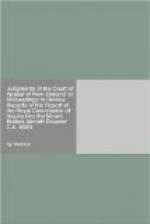...
6. The costs incurred by the Government in respect of this Inquiry have been calculated by the Tribunals Division of the Department of Justice at $275,000. A substantial liability for the burden of such costs must lie upon the State but in my opinion the State ought to be in part reimbursed in respect of the cost to the public of the Inquiry, and I accordingly direct that Air New Zealand Limited pay to the Department of Justice the sum of $150,000 by way of contribution to the public cost of the Inquiry.
The order is in any event invalid because the amount is far greater than the maximum allowed by the long out-of-date but apparently still extant scale prescribed in 1903 (1904 Gazette 491). It is only fair to the Commissioner to say that the scale seems never to have been drawn to his attention by any counsel, although he gave an opportunity to make submissions on costs. But there is a deeper objection to the validity of the order, to which we will come shortly.
Conclusions
Having set out the various complaints we now state our conclusions more specifically than in the earlier part of this judgment.
As to the jurisdiction of the Court in the present proceedings, the application is made solely under the Judicature Amendment Act 1972. Under that Act a decision cannot be set aside unless it was made in exercise of a statutory power and either it could have been quashed in certiorari proceedings at common law—that is the effect of s. 4 (1)—or the applicant is entitled to a declaration that it was unauthorised or invalid, in which case s. 4 (2) empowers the Court to set aside the decision instead.
The Erebus Commission, like others in the past in New Zealand when a Supreme Court Judge has been the Chairman or the sole Commissioner, was expressed to be appointed both under the Letters Patent delegating the relevant Royal Prerogative to the Governor-General and under the authority of and subject to the provisions of the Commissions of Inquiry Act 1908. Some of us have reservations on various legal questions—whether the Commission had statutory authority for its inquiry as well as Prerogative authority; whether the findings in the body of the report amounted to ‘decisions’, whether complete absence of evidence is relevant in considering natural justice or can be redressed in proceedings of this kind. These questions may




